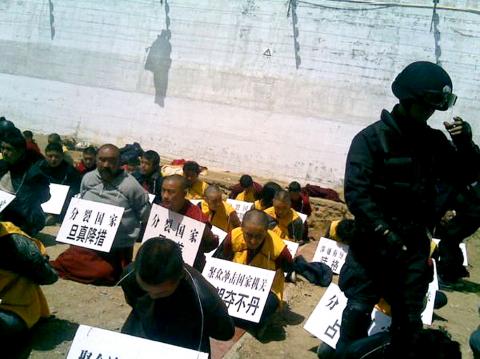Recently leaked footage of a crackdown by Chinese security forces in Tibet indicates that the level of repression against Tibetans appears to be much more serious than generally acknowledged by the international community.
A video posted on the exile Tibetan Web site TibetOnline.tv on Wednesday showed a raid by a Chinese SWAT team comprising about 100 People’s Armed Police (PAP) officers on what is believed to be Unit 2 of Dode Village, near the Sera monastery northeast of Lhasa.
The quality footage, which is believed to have been shot in 2008, displays an unprecedented show of force by Chinese authorities, with SWAT teams, accompanied by numerous dogs and an armored vehicle, assuming attack formation and aiming assault rifles at sleeping villagers. In all, four confused-looking men and one elderly woman are taken away. Each is forced to stare into the camera and provide details to the cameraman, who is presumably a PAP member.

Photo: AFP
Unlike previous unrest, such as the 1989 riots in Lhasa or the March 2008 incident, during which nervous and sometimes vengeful PAP officers were confronted with an emergency, the troops in the video are not responding to any immediate threat.
As of last evening, the 22-minute video appeared to have been taken offline. It has since emerged on YouTube.
The material follows the release on the citizen journalism Boxun Web site last week of eight photographs showing Tibetan prisoners being paraded by a large contingent of armed police in China’s Sichuan Province, also in 2008 or later.
The two releases have led analysts to conclude that someone in China, perhaps within the security apparatus, is leaking information to show the true scale of repression in Tibet and neighboring areas in China.
Reacting to the video, Dawa Tsering, chairman of the Tibet Religious Foundation of His Holiness the Dalai Lama — the de facto representative of the exiled government in Taiwan — said that the way in which Chinese treat Tibetans showed them to be a conquered and colonized people.
“Any Tibetan with a heart will never forget this humiliation, we will not forget how arrogant the Chinese are and the humiliation we went through,” he said. “We will remember this for generations to come and this memory will constantly remind us of what we should do.”
Former Regional Tibetan Youth Congress Taiwan president Tashi Tsering said he was not surprised by what Chinese police officers did to Tibetans.
“That’s how the Chinese Communist Party has always treated Tibetans,” Tashi said via telephone. “The Chinese always claim they respect human rights, but what they do is different from what they say. Taiwanese should know this and be very careful when dealing with China.”
He called on the international community to launch a probe into human rights violations in Tibet.
Additional reporting by Loa Iok-sin

CHAOS: Iranians took to the streets playing celebratory music after reports of Khamenei’s death on Saturday, while mourners also gathered in Tehran yesterday Iranian Supreme Leader Ayatollah Ali Khamenei was killed in a major attack on Iran launched by Israel and the US, throwing the future of the Islamic republic into doubt and raising the risk of regional instability. Iranian state television and the state-run IRNA news agency announced the 86-year-old’s death early yesterday. US President Donald Trump said it gave Iranians their “greatest chance” to “take back” their country. The announcements came after a joint US and Israeli aerial bombardment that targeted Iranian military and governmental sites. Trump said the “heavy and pinpoint bombing” would continue through the week or as long

TRUST: The KMT said it respected the US’ timing and considerations, and hoped it would continue to honor its commitments to helping Taiwan bolster its defenses and deterrence US President Donald Trump is delaying a multibillion-dollar arms sale to Taiwan to ensure his visit to Beijing is successful, a New York Times report said. The weapons sales package has stalled in the US Department of State, the report said, citing US officials it did not identify. The White House has told agencies not to push forward ahead of Trump’s meeting with Chinese President Xi Jinping (習近平), it said. The two last month held a phone call to discuss trade and geopolitical flashpoints ahead of the summit. Xi raised the Taiwan issue and urged the US to handle arms sales to

State-run CPC Corp, Taiwan (CPC, 台灣中油) yesterday said that it had confirmed on Saturday night with its liquefied natural gas (LNG) and crude oil suppliers that shipments are proceeding as scheduled and that domestic supplies remain unaffected. The CPC yesterday announced the gasoline and diesel prices will rise by NT$0.2 and NT$0.4 per liter, respectively, starting Monday, citing Middle East tensions and blizzards in the eastern United States. CPC also iterated it has been reducing the proportion of crude oil imports from the Middle East and diversifying its supply sources in the past few years in response to geopolitical risks, expanding

Pro-democracy media tycoon Jimmy Lai’s (黎智英) fraud conviction and prison sentence were yesterday overturned by a Hong Kong court, in a surprise legal decision that comes soon after Lai was jailed for 20 years on a separate national security charge. Judges Jeremy Poon (潘兆初), Anthea Pang (彭寶琴) and Derek Pang (彭偉昌) said in the judgement that they allowed the appeal from Lai, and another defendant in the case, to proceed, as a lower court judge had “erred.” “The Court of Appeal gave them leave to appeal against their conviction, allowed their appeals, quashed the convictions and set aside the sentences,” the judges